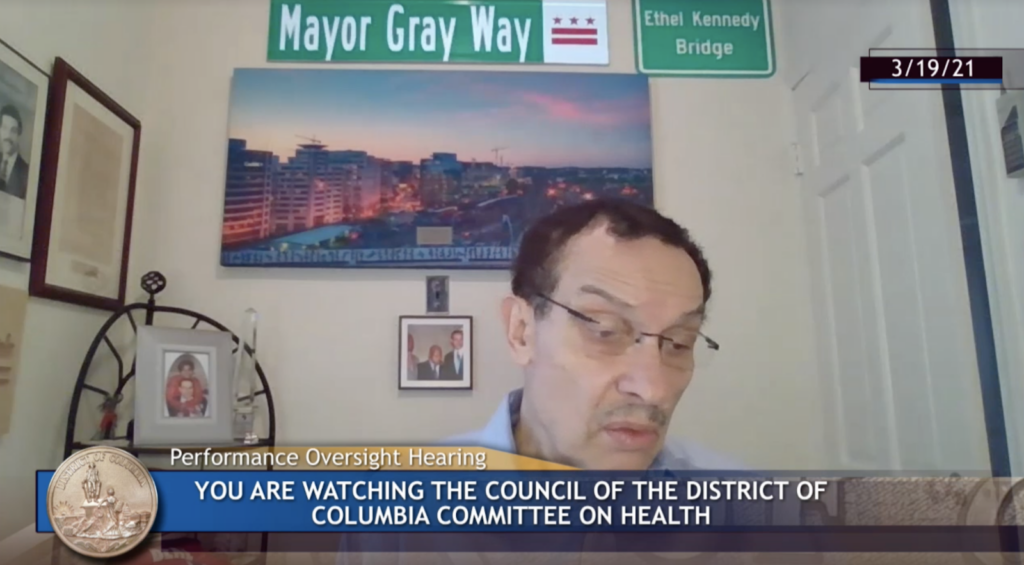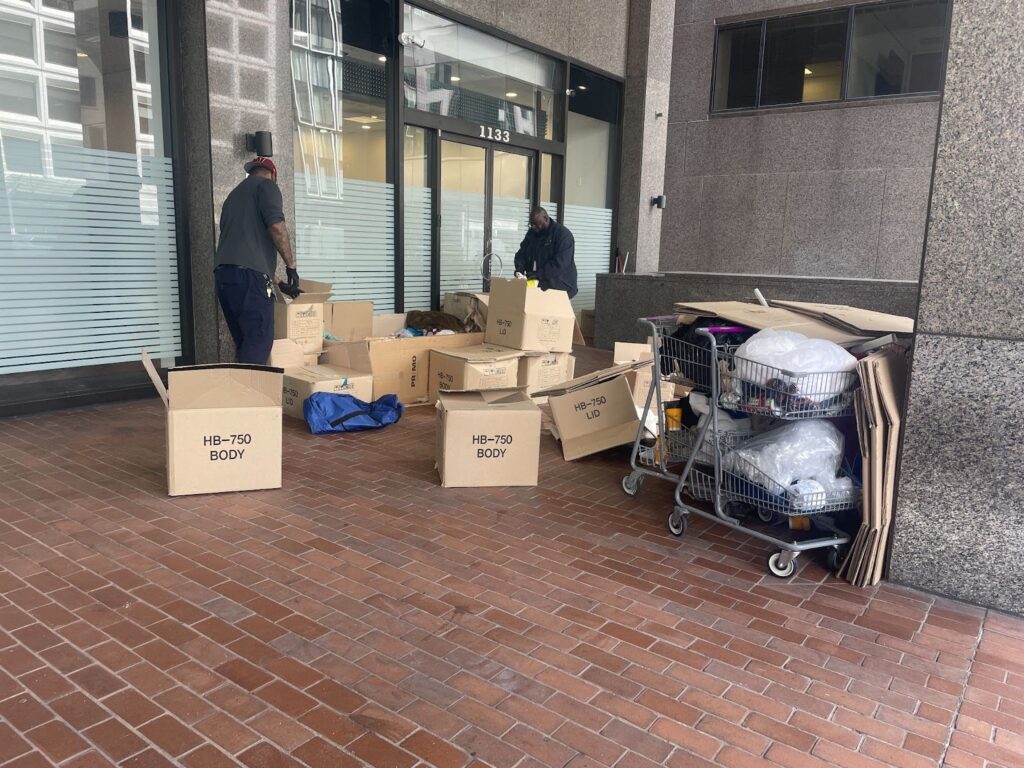District residents, government officials, and health professionals gathered virtually last month for the D.C. Department of Health’s oversight budget hearings for fiscal year 2020 and the first half of fiscal year 2021, where several requests were made to better support those experiencing homelessness and poverty.
The hearings took place on March 4 and 19 and were led by Ward 7 Councilmember Vincent Gray, the chair of the D.C. Committee on Health. Public and governmental witnesses offered testimony on a variety of topics, including expanding health care accessibility, increasing resources for people experiencing homelessness, and bolstering communication between agencies and local, nonprofit groups and service agencies. Government officials also highlighted the new hospital at St. Elizabeths East and urgent care centers in wards 7 and 8 and the District’s coronavirus pandemic response.
The Deputy Mayor for Health and Human Services, and the directors of the Department of Health Care Finance, the United Medical Center and D.C. Health served as governmental witnesses, presenting programming successes and failures. Gray began the March 19 hearing by addressing the more than 1,000 deaths caused by COVID-19 in the District.
“A year ago at the performance oversight hearing for the Department of Health, we were just learning about COVID-19,” Gray said. “It seems surreal now that in a matter of weeks from that hearing that our whole lives would be a little bit turned upside down.”
Resources for people experiencing homelessness
Jesse Rabinowitz, the advocacy and campaign manager at Miriam’s Kitchen, asked the council to increase health resources for those experiencing homelessness.
He suggested more sanitation stations for unhoused residents not in shelters, heating options for encampments similar to outdoor-dining tents, ending encampment evictions, and improving permanent-housing accessibility for unhoused residents.
Rabinowitz urged the council to invest $100 million to end chronic homelessness, the Way Home Campaign’s FY22 budget proposal. The campaign, supported by a coalition of organizations, is organized by Miriam’s Kitchen. Rabinowitz said funds currently being used to close encampments should instead be reinvested to fund a portion of the $100 million suggestion, as well.
[Disclosure: Street Sense Media, our publisher, is a member of the Way Home Campaign. The organization’s advocacy efforts do not influence our reporting or infringe on our editorial independence.]
“People experiencing homelessness suffer stark, deadly, and often preventable or manageable health dilemmas,” Rabinowitz said. “With housing, people thrive. We must take an expensive and expansive view of health.”
Rabinowitz presented after James Williams, a Ward 4 resident and member of the Petworth Get Wise coalition who testified because of “lack of communication” with Ward 4 residents as it relates to encampments.
“I want to make clear that the purpose of my testimony is not to debate whether city officials should remove the homeless from their encampments during the pandemic,” Williams said, “but instead to highlight the importance of city officials communicating with the surrounding and impacted communities.”
Trash pickup and general sanitation are now the responsibility of the community, Williams said, due to the lack of transparency to who’s responsible for maintenance and cleanup.
This is largely due to gaps in communication between government agencies, Williams said. A couple experiencing homelessness recently stacked unwanted items on a street corner in Petworth including sofa cushions and grocery carts. These items were never picked up, he said, due to a lack of action by the Department of Health and Human Services.
“As you know, Mr. Chairman, 311 will not pick up trash if it’s not associated with a physical address,” Williams said. “And the night sanitation crews do not pick up such trash. Therefore, the responsibility fell upon the community members.”
Williams was also told by the Department of Health and Human Services that the cleanup of needles and biowaste was to be directed to ANC commissioners.
“The directive to not contact them about this matter was unacceptable, dismissive and disrespectful to our community,” Williams said.
Rabinowitz noted in his testimony that encampments should not be cleared unless “absolutely necessary from a public health perspective — not when neighbors complain about being forced to see the reality of D.C.’s homelessness crisis,” he said.
[Read more: Making room for construction in NoMa, DC government conducts its 18th encampment cleanup in 2021]
Kirk Ellis, a longtime District resident who formerly experienced homelessness, also supported increased resources for those who are unhoused. He suggested the council set aside funds for city-sanctioned storage containers that people experiencing homelessness could use to protect personal items from weather or routine cleanups.
Ellis also serves as a self-employed outreach worker. For example, in January 2020, Ellis created a GoFundMe fundraiser “Sleep Warm Tonight” to distribute 1,000 sleeping bags to people experiencing homelessness in D.C.

Through such outreach work, Ellis testified that he’s seen inefficient information sharing with multiple different government departments and non-profit service providers and partners. He suggested increased town halls and better communication between organizations about changing policies and resources.
“After all, it takes a village,” Ellis said. “We could better umbrella the already provided services … into a better collaboration.”
Reginald Black, a longtime D.C. resident who formerly experienced homelessness also presented to the council the need for increased collaboration and transparency between agencies and local organizations.
Black is the advocacy director for the People for Fairness Coalition, a grassroots organizing group of homeless and formerly homeless people who aim to end housing instability through advocacy and peer mentoring. Black is also a constituent representative on the D.C. Interagency Council on Homelessness and an artist and vendor with Street Sense Media.
He directly criticized District agency leaders at the hearings for a lack of participation in events and meetings related to people experiencing homelessness, including D.C. Health Director Dr. LaQuandra Nesbitt and Wayne Turnage, who serves as both the director of the Department of Health Care Finance and the deputy mayor for health and human services that oversees both offices. Black specifically claimed Turnage did not attend public sessions before the permanent removal of encampments on K Street NE when the underpass there was designated as a “pedestrian passageway.”
“Deputy Turnage, I don’t see you at meetings,” Black said. “You and I don’t have a working relationship. And I’m an appointed member [of the ICH] with lived experience [of homelessness].”
Turnage and Nesbitt did not respond to requests for comment and the councilmembers conducting the hearing did not ask them to respond to Black’s testimony.
Black also said concrete action to address racial inequality in the area has been slim.
“Recently, the District of Columbia has advanced racial equity in language,” Black said at the March 4 hearing. “It is safe to say that we have yet to really put these words to use or act.”
The People for Fairness Coalition has been providing personal care items like toilet paper, hand sanitizer and masks to people experiencing homelessness. Black said D.C. Health should be taking on this responsibility.
Black also urged the council to streamline the process of obtaining identification documents to remove barriers for those who do not have permanent housing.
Expanding hospital care, telemedicine
The president of the board of the Medical Society of D.C., Dr. E.W. Emanuel, requested to expand the use of telemedicine post-pandemic. This will improve access to care and allow physicians to practice in medically underserved areas, he said, such as wards 7 and 8.
Flexibility in treating local patients across state lines with telemedicine would also improve access, he said. Specifically, Emanuel said, the District’s health system should permit the freedom to treat patients in D.C. via telemedicine if the health care provider is located across state lines and there is a pre-existing treatment relationship.
Turnage focused much of his testimony and presentation on March 4 to discuss the new hospital and urgent care centers in wards 7 and 8.
The new hospital is set to open in late 2024, and the urgent care center in Ward 7 will open in late 2021, said Kimberly Russo, the chief executive officer at the George Washington University Hospital. The urgent care in Ward 8 will open in 2022, she said.
The new hospital will be built on the existing 801 East Men’s Shelter, said Ben Stutz, the chief of staff at the Office of the City Administrator and at the St. Elizabeths East Hospital. A new shelter is currently being built at a different location and will open late this year.
“Based on everything that has happened over the past year, it is more evident than ever that there is a need for health care east of the Anacostia River,” Stutz said. “Unfortunately, the region of the city, as you have heard, has been harder hit in this pandemic than other regions in the district and reflects all that we must do to improve healthcare access, equity and outcomes.”








